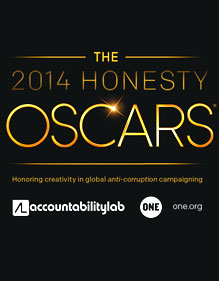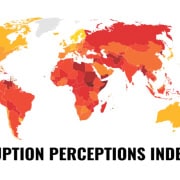|
Getting your Trinity Audio player ready...
|
 By Valencia Talane
By Valencia Talane
In a week where the world waited anxiously for the very popular Oscars, which centre on the film industry, conscientious citizens of the world were urged to participate in a different set of awards – ones that reward innovation in the all-important fight for transparency in governments and the eradication of corruption.
The Honesty Oscar Awards do not celebrate mainstream actors, filmmakers or directors, but in a clever take on the Hollywood event, they pay tribute to those who creatively spread the anti-corruption message and demand accountability and honesty from world leaders. The awards are an initiative of the Accountability Lab, a non-profit organisation that supports innovative efforts to fight corruption in the development field around the globe and One.org, an anti-poverty advocacy group based in Africa.
In the week of 24 – 28 February, the global public was mobilised to vote via the internet and social media in five categories, namely best activist in a leading role, for an individual corruption fighter; best visual effects, for the best graphic presentation of statistics linked to corruption; best activist anthem, for a song that best sends a corruption-combating message; best director, for leaders who have a clear vision of a corruption-free world, and visualise and carry out that vision with the help of their talented crew, and best picture, for the best production presented in video form.
The winners were announced on 3 March.
Corruption Watch board member Alice Brown was nominated for best director. She lost out to Tanzanian civil society activist Rakesh Rajani, head of Twaweza – an initiative that works to give citizens the information they need to hold their government accountable – and HakiElimu, which mobilises Tanzanians at grassroots level around issues of democracy, governance, and quality of education. Rajani took 54% of the 727 votes cast.
More winners
Other contenders in Rajani’s category included Kenyan lawyer and blogger Ory Okolloh, who helped create the groundbreaking crowdsourcing initiative Ushahidi; Ellen Miller from the US-based Sunlight Foundation, which makes sure government data is open and available to the public; and Clare Short, board chairperson of the Extractive Industries Transparency Initiative, which set the standard of transparency for payments made to countries for natural resources, creating accountability for revenues from natural resources.
The winner in the best picture category was a four-minute video by Open for Change, a global network of organisations that advocate for transparency in the field of development. The video promotes transparency in developmental efforts, encouraging the concept of open development and its implementation through technology available to Africans today – it garnered a whopping 62% of the 727 votes cast. The other nominees were "Money Laundering: by Global Financial Integrity; "Et da munneh" (Ate the Money) from an unknown Ugandan source; "What Exactly is Big Oil Hiding?" by Oxfam; and "Anti-Corruption Video" by USAID in Sri Lanka,
Linet Kwamboka, of the Kenya ICT Board, is interviewed in the video explaining her country’s efforts to enable citizens to participate in information sharing for development projects. “By government opening up information on community development funds,” she explains, “this shows citizens what kinds of development is happening in their community and therefore enables them to hold their government accountable.”
Over 3 500 people voted in the visual effects category, 54% of them for the International Budget Partnership’s Open Budget Survey 2012, which interrogated the state of transparency of government budgets around the world. The survey beat Transparency International’s Corruption Perception Index; Global Financial Integrity’s Illicit Financial Flows Heatmap; Open Corporates’ US Bank Control Chain Map and The Guardian’s infographic on women’s rights.
With 54% of the 6 600-plus votes cast in this category, Indonesia Corruption Watch’s Sely Martini took the title of best activist in a leading role. Martini is the deputy director of her organisation and has been working there for a decade. She was up against Kenya’s John Githongo; Aruna Roy from India; Gregory Ngbwa Mintsa from Gabon; and China’s Xu Zhiyong.
In a 2012 interview with The Jakarta Globe, she had this to say about the challenges of her work: “The poor can’t get access to the private hospitals or private education, so [they] will suffer more because of corruption. Corruption eats the cake before you can eat it. It’s the core of developmental problems.”
Asked about her perspective on corruption around the world, Martini said women should be more involved in anti-corruption movements. “Corruption is not limited to gender. There are a lot of women who are committed to corruption, and the temptation to corrupt goes to women as well as men.”
The award for best activist anthem went to “Down by the Riverside” by Dr Sley and Da Green Soljas of Cameroon. It scooped 40% of the more than 80 000 votes, and portrays the ills in society that are brought on by dishonest people. Besides the Honesty Awards win, “Down by the Riverside also won the Fair Play Anti-Corruption Youth Voices awards last year. Other contenders were “El Soor” (The Wall) from Egypt; “Sheria” from Kenya; “Mujhse Hogi Shurvaat” from India; and “Pot Boiling Remix” from Liberia.








